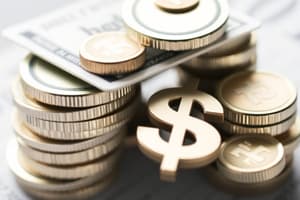Podcast
Questions and Answers
What is the primary purpose of the Executive Committee within a firm?
What is the primary purpose of the Executive Committee within a firm?
- To authorize quick decisions between regular meetings (correct)
- To oversee the annual budget planning process
- To manage external stakeholder communications
- To assess board recruitment and effectiveness
Which factor typically leads firms to establish larger boards?
Which factor typically leads firms to establish larger boards?
- Lower operational complexities
- Expectations for independent oversight
- Higher monitoring costs (correct)
- Influence from regulatory agencies
What challenges can arise from the separation of ownership and control in growing firms?
What challenges can arise from the separation of ownership and control in growing firms?
- Increased financial transparency
- Greater access to diverse board members
- Potential misalignment between owner interests and management actions (correct)
- Uniform decision-making processes
How often does the Audit Committee typically convene?
How often does the Audit Committee typically convene?
What does the Governance Committee primarily focus on?
What does the Governance Committee primarily focus on?
What does the dividend payout measure?
What does the dividend payout measure?
Why are stock repurchases gaining popularity among firms?
Why are stock repurchases gaining popularity among firms?
What is the formula for Dividend Yield?
What is the formula for Dividend Yield?
What is often interpreted as a signal of financial trouble within a company?
What is often interpreted as a signal of financial trouble within a company?
What is one of the roles of the Board of Directors?
What is one of the roles of the Board of Directors?
What percentage of all boards in the US are made up of independent directors?
What percentage of all boards in the US are made up of independent directors?
What is the role of the Chairman in relation to shareholders?
What is the role of the Chairman in relation to shareholders?
What defines an independent director?
What defines an independent director?
Flashcards
Retention Rate
Retention Rate
The percentage of earnings a company keeps after paying dividends. It's calculated as 1 minus the payout rate.
Payout Rate
Payout Rate
The percentage of earnings a company distributes as dividends. It's calculated as dividends divided by net income.
Dividend Cut
Dividend Cut
A reduction in the company's dividend payments to shareholders. It's often a signal of financial distress.
Stock Repurchase
Stock Repurchase
Signup and view all the flashcards
Dividend Yield
Dividend Yield
Signup and view all the flashcards
Corporate Governance
Corporate Governance
Signup and view all the flashcards
Independent Director
Independent Director
Signup and view all the flashcards
Chairman of the Board
Chairman of the Board
Signup and view all the flashcards
Independent Director Oversight
Independent Director Oversight
Signup and view all the flashcards
CEO Influence on Independent Directors
CEO Influence on Independent Directors
Signup and view all the flashcards
Executive Committee Purpose
Executive Committee Purpose
Signup and view all the flashcards
Audit Committee Meetings
Audit Committee Meetings
Signup and view all the flashcards
Governance Committee Focus
Governance Committee Focus
Signup and view all the flashcards
Study Notes
Dividend Policy
- Retention Rate (RR) is calculated as 1 minus the Payout Rate.
- Firms are reluctant to cut dividends.
- Higher dividends mean less internal cash for investment.
- Dividends are not the only way to distribute cash; stock repurchases are an alternative.
- Stock repurchases are popular due to tax advantages and potential shareholder preferences.
- Dividend payout measures the percentage of earnings paid out as dividends.
- Payout Rate = Dividends / Net Income.
- A dividend cut is often a sign of trouble.
- Tax shield and dividend taxes affect dividend policy.
- Dividend Yield = Dividends / Equity Value; measures return from dividends alone.
- In a perfect market with no taxes, dividend policy is irrelevant.
Corporate Governance
- Corporate Governance is a system of rules, practices, and processes guiding a firm's direction and control.
- Corporate Governance balances interests of shareholders, management, customers, and the community.
- Board of Directors' roles:
- Selecting, monitoring, evaluating, and compensating senior management.
- Ensuring adequate management succession planning.
- Reviewing and approving significant corporate actions, operating plans, budgets, and financial statements.
- Monitoring corporate performance, financial controls, ethical standards, and legal compliance.
- Overseeing enterprise risk management and shareholder, employee, and community relations.
- Chairman's role:
- Presiding officer of the board.
- May also be the CEO.
- Chosen by other board members.
- Ensures shareholder duties are fulfilled.
- Acts as a link between the board and upper management.
- Company's leading representative to the outside world.
- Independent Director: a director with no material or pecuniary relationship with the company.
- 62% of US boards are comprised of independent directors.
- NYSE and NASDAQ require more than 50% independent directors on boards.
- Independent oversight from independent directors is not guaranteed.
- CEOs may influence independent directors.
- Executive Committee: authorized to make quick decisions between regular meetings.
- Audit Committee: typically meets seasonally, often tied to the end of the fiscal year.
- Governance Committee: responsible for board recruitment and assessment.
- Finance Committee: handles the annual budget.
- Program Committee: oversees long-range planning.
Factors Affecting Board Structure
- Diversified firms often have larger, more independent boards.
- Firms with higher monitoring costs tend to have larger boards.
- Firms with influential CEOs may have boards with less independence.
- Small firms typically don't separate ownership from control; as size increases, a separation naturally arises, potentially creating problems.
Studying That Suits You
Use AI to generate personalized quizzes and flashcards to suit your learning preferences.




